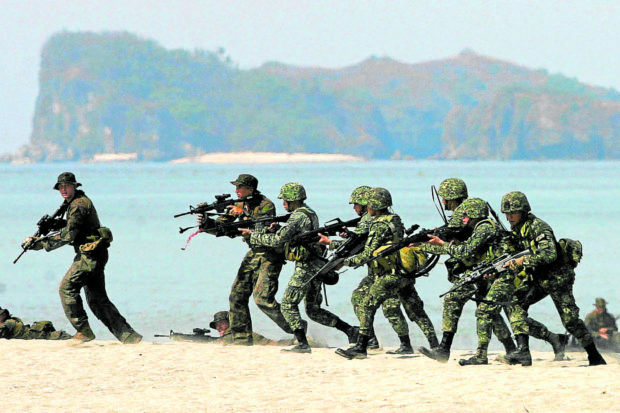Duterte demands $16 billion for hosting US troops

JOINT TRAINING In this photo taken in 2015, a team of US Marines and Filipino soldiers trains on a beach along the West Philippine Sea in San Antonio town, Zambales province, as part of the Balikatan military exercises between the United States and the Philippines. —MARIANNE BERMUDEZ
MANILA, Philippines — In exchange for the Visiting Forces Agreement (VFA), the Philippines should get something like $16 billion that Pakistan had received in counterterrorism assistance from the United States from 2001 to 2017, Malacañang said on Monday.
Presidential spokesperson Harry Roque said the Philippines received only a total of $3.9 billion from the United States in the same period.
President Rodrigo Duterte earlier said the US government must pay if it wanted to keep the VFA, an agreement signed in 1998 that allows American troops to come to the Philippines for joint military exercises with Filipino troops and humanitarian missions.
He ordered the abrogation of the agreement last year, but suspended the move because of the coronavirus pandemic and “heightened superpower tensions.”
Defense and foreign affairs officials have spoken against the termination of the deal, warning that the country could lose billions of dollars worth of assistance and that it could undermine Philippine defense and security arrangements.
Many critics have said the VFA, which also provides rules for the entry and departure of military personnel and supplies, is just as detrimental. For instance, it abdicates Philippine sovereignty when trying US personnel who commit crimes, they say.
Roque did not answer directly how the administration would make up for the benefits that the Philippines would lose should the VFA be terminated because Washington would not want to pay up.
“The President has been clear. He wants compensation. If the Americans don’t agree, then there is also the previous declaration of the Filipino president that he will terminate the VFA,” he said.
Extortion?
Vice President Leni Robredo on Sunday scored the President’s remarks demanding that the United States cough up money in exchange for the VFA. She warned that such statements could be misconstrued as extortion.
“It’s embarrassing,” Robredo said in her weekly radio show. “It’s like extortion. [It’s like we’re crooks] — if you want this, pay up.”
Former foreign secretary Albert del Rosario on Monday called the President’s position “incomprehensible” and “unfortunate.”
Del Rosario said Duterte should instead seek payment for P230 billion worth of damage from China for its massive marine destruction in the West Philippine Sea.
Roque disputed allegations that the President’s demand constituted “extortion,” saying that seeking payment would protect the interest of Filipinos while providing the country with much-needed funds for COVID-19 response and for social services.
“Pakistan got $16 billion. We think we should get something similar or close to that amount. But definitely, not the amount we’re currently getting,” he said in a press briefing.
“We are basing it on the fact that we have had historically very strong ties and if you have very strong ties with a very strong ally, then I think it also comes with a higher amount of financial assistance to be given,” Roque said.
Stimson Center study
Citing figures on US assistance from Stimson Center’s study on counterterrorism spending, Roque said the United States had been giving “very little” to the Philippines, which, he added, received one of the lowest amounts of military assistance from 2001 to 2017.
This was despite the Philippines not just hosting American soldiers but also giving them access to the Philippines’ military establishments and allowing them to preposition their equipment there through the Enhanced Defense Cooperation Agreement, he said.
“But how much are we getting for this? According to the study, we got $3.9 billion. Is this a big amount? It is loose change when compared to what other countries got,” he said.
Unlike the Philippines, Pakistan only became a US ally not too long ago, and yet it got $16.4 billion, he said. Afghanistan received the biggest amount of assistance at $97.8 billion, according to the study.
“Why would we not get a bigger amount when we have a lot of expenses, especially for COVID-19?” Roque said. He said the Philippines would not ask for COVID-19 vaccines from the United States as payment because it was willing to pay for these.
Last December, Duterte said he would push through with the termination of the VFA unless the United States provided the Philippines with vaccines. But Roque said what the President was asking for was a commitment on the allocation of vaccines for the country.
He said the Philippines could ask for US payment because it stood to be affected should hostilities break out between China and the United States.
‘Rightfully ours’
But for Robredo, asserting the country’s rights should not necessarily mean “we are fighting with China.”
“We’re not trying to pick a fight. We’re just fighting for what is rightfully ours. If we can’t even do that because we’re so terrified of others, it’s so shameful,” she added.
In his statement on Monday, Del Rosario explained that the VFA was an implementation of the 1951 Mutual Defense Treaty forged by the United States and the Philippines as security partners after World War II.
“It is incomprehensible that when partners help each other against a common enemy, one party is asking his partner to pay. This is the gist of the President’s unfortunate position on the VFA,” he said.
Del Rosario led the Philippine delegation that challenged China’s expansive claim over virtually the entire South China Sea in the Permanent Court of Arbitration, which ruled to invalidate China’s so-called historic rights.
—With reports from Krixia Subingsubing and Tina G. Santos